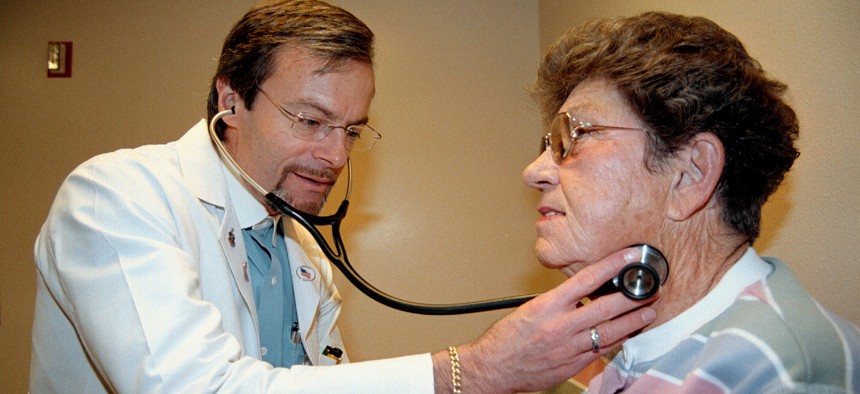Connecting state and local government leaders
The program wants to increase primary care for Medicare and Medicaid recipients while reducing hospital and emergency room visits.
The federal government wants to improve primary care in several states around the country by changing how hospitals are paid. Under a new grant opportunity announced last week, the feds will give eight states up to $12 million apiece to implement reforms designed to curb health care cost growth, improve population health and advance health equity.
States will almost certainly take different approaches under the program, said Alice Burns, associate director of the Program on Medicaid and the Uninsured for the health care policy think tank, KFF. But broadly speaking, she said, the effort by the Centers for Medicare & Medicaid Services seeks to encourage states to adopt so-called global budgets, where hospitals are paid a lump sum upfront for treating patients over a defined period, instead of being paid for each service piecemeal.
The idea, Burns said, is to create an incentive for providers to improve primary care and, therefore, overall health outcomes. As a result, fewer people would need to be treated inside hospitals and emergency rooms, reducing costs.
“The goal here is to keep people out of the hospital,” she said. “If we can reduce unnecessary emergency room utilization, we'll have more money to spend on primary care.”
Indeed, CMS said in its notice that the initiative, Advancing All-Payer Health Equity Approaches and Development, or AHEAD, “aims to leverage hospital global budgets and primary care investment targets to shift health care spending and utilization from acute care settings to primary care and community-based settings.”
Under the program, states will be required to meet certain targets, most notably constraining the growth of Medicare while also increasing the amount being spent on primary care. States would also have to meet equity targets to ensure low-income and other disadvantaged people are receiving primary care. Should they not be able to meet the goals, CMS could force states to take corrective action or redirect the money to primary care providers.
AHEAD, according to Burns, builds on lessons learned from existing state-based models in Maryland, Pennsylvania and Vermont. The federal government wants to see some of those efforts replicated in more states.
“I think that CMS has noticed that a couple of states have had some really promising results,” she said.
Under the Total Cost of Care model, for example, CMS wanted to encourage “hospitals to eliminate unnecessary hospitalizations.” So in 2014 it began giving hospitals in Maryland certain amounts of Medicare funding based on the population they serve. The funding gave hospitals the incentive to pay other providers to increase the health care they provide and, as a result, reduce the number of people seeking treatment in emergency rooms or hospitals.
Spending outside of hospitals has increased under the program. But because costlier hospital admissions and emergency room visits have gone down, overall Medicare spending in the state has decreased.
Another aspect of AHEAD is modeled after a program in Pennsylvania in which rural hospitals began receiving a fixed amount of funding upfront in 2017. Rural hospitals in the state had not had the funding or the workforce to improve the quality of their health care and, as a result, have closed. But being guaranteed a fixed amount, regardless of how many patients are seen, allowed these rural hospitals to “invest in high-quality primary and specialty care,” including offering social services, preventative screenings and substance abuse treatment.
Under the funding notice, states have options with different timelines for development of a plan and implementation of that plan. Based on what options states choose, they have different application deadlines. For example, states that want to start their program in January 2026 or January 2027 have until next March 18 to submit their application.
Burns is “really curious” to see how many states will apply, given that hospitals, primary care providers and insurance companies in those states would have to agree to take part. But she said the program is appealing to states for a number of reasons, including receiving millions of dollars to help with health care costs and a chance to design a program that reduces costs while improving health services for residents.
“It’s really an opportunity to hopefully achieve a system that yields better outcomes at a more sustainable cost,” she said.
Kery Murakami is a senior reporter for Route Fifty, covering Congress and federal policy. He can be reached at kmurakami@govexec.com. Follow @Kery_Murakami

NEXT STORY: The future of the Colorado River hinges on one young negotiator




